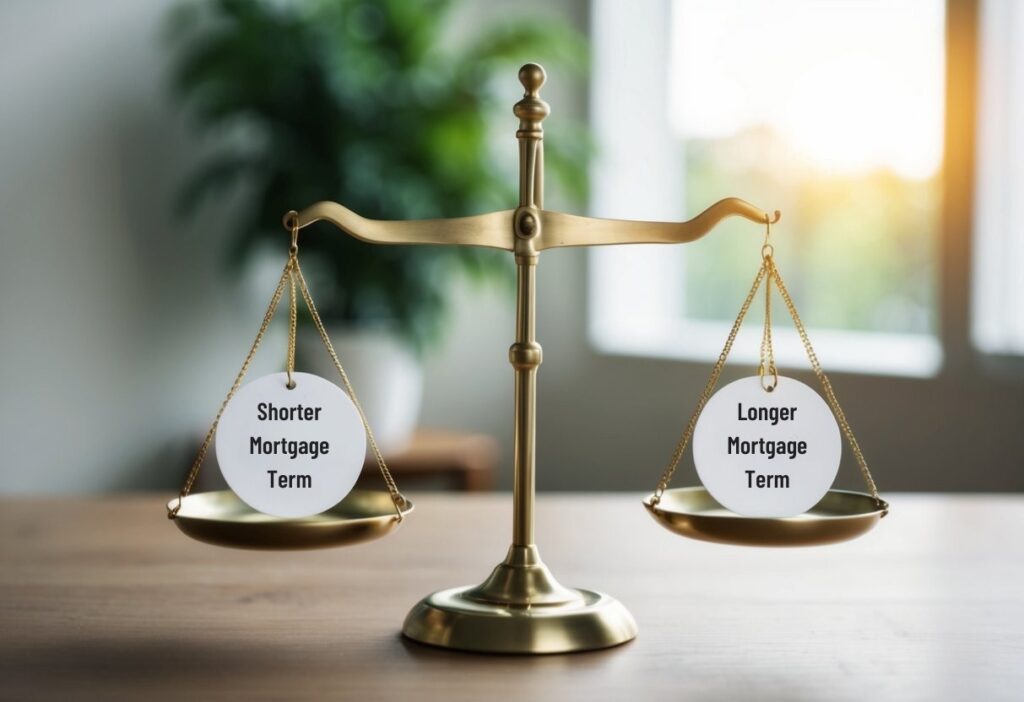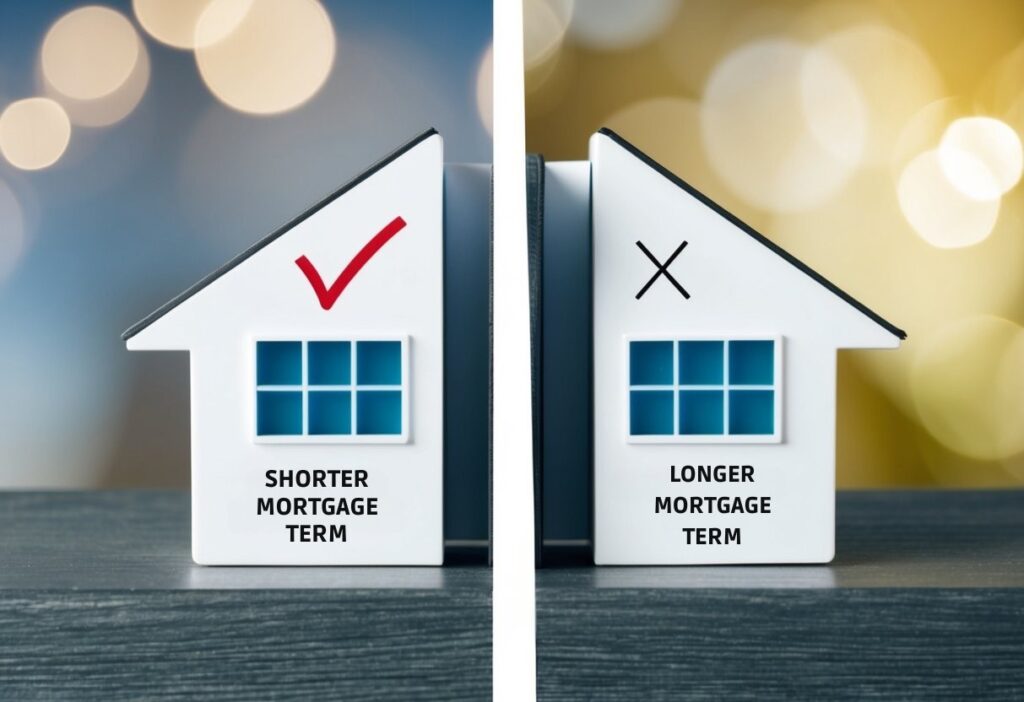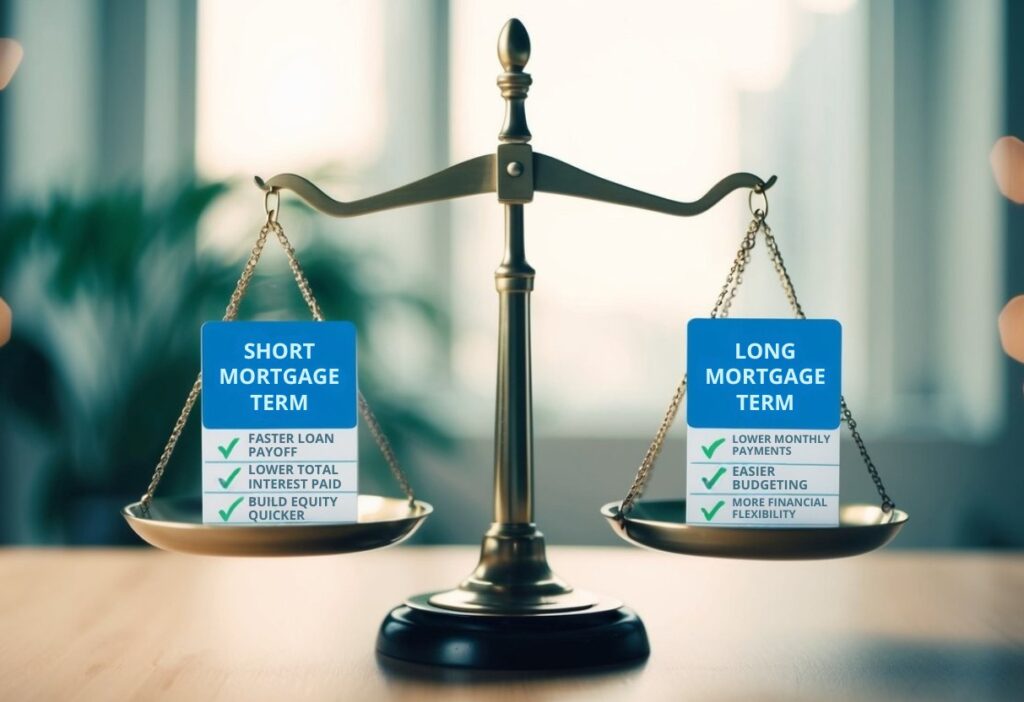Anúncios
Choosing the right mortgage term can be a tough decision for homebuyers. The length of your mortgage affects your monthly payments, how quickly you build equity, and the total amount of interest you’ll pay over time.
Many people struggle with deciding between a shorter term with higher payments or a longer term with more interest costs.

The best mortgage term depends on your financial goals, current income, and how long you plan to stay in the home.
Shorter terms like 15-year mortgages offer lower interest rates and faster equity building but require higher monthly payments. Longer terms such as 30-year mortgages provide lower monthly payments but cost more in total interest over the life of the loan.
Most homebuyers need to balance their current budget constraints against their long-term financial objectives. Factors like job stability, emergency savings, and retirement planning all play important roles in this decision.
Understanding the pros and cons of different mortgage terms helps buyers make choices that align with both their immediate needs and future plans.
Understanding Mortgage Terms

When choosing a home loan, the length of time you’ll be paying it back affects your monthly payments and total interest costs. This decision impacts your budget now and your financial future.
Definition of Mortgage Term
A mortgage term refers to the length of time you agree to repay your home loan. Common mortgage terms in the US include 15, 20, and 30 years.
The term directly impacts your monthly payment amount and the total interest paid over the life of the loan.
Shorter terms typically range from 10-20 years, while longer terms usually span 25-30 years. Your mortgage term is specified in your loan agreement, along with your interest rate and payment schedule.
The term begins on the closing date and continues until your final payment. Most borrowers maintain the same term throughout their loan, though refinancing can change this timeline.
Comparison of Short-Term vs Long-Term Mortgages
Short-Term Mortgages (10-20 years)
- Higher monthly payments but faster equity building
- Lower interest rates (typically 0.5-1% less than longer terms)
- Less total interest paid over the life of the loan
- Faster path to full ownership
Long-Term Mortgages (25-30 years)
- Lower monthly payments, easier on monthly budget
- More interest paid over time
- Greater flexibility for other investments
- Better option for cash flow management
A $300,000 loan at 6% interest would cost approximately $2,530 monthly for 15 years versus $1,799 monthly for 30 years. The 15-year loan saves about $177,000 in interest but requires $731 more each month.
Your choice depends on your financial goals, income stability, and whether you prioritize lower payments now or paying less interest overall.
Pros and Cons of Shorter Mortgage Terms

Shorter mortgage terms typically range from 10 to 20 years compared to the standard 30-year option. These loans offer significant financial advantages but also come with important considerations for your monthly budget.
Higher Equity and Faster Payoff
Shorter mortgage terms allow homeowners to build equity much faster. With a 15-year mortgage, you’ll own your home completely in half the time compared to a 30-year option. This rapid equity building creates a stronger financial position.
Your loan balance decreases more quickly each month because a larger portion of your payment goes toward the principal rather than interest.
For example, after 5 years of payments on a $300,000 loan, you might have paid off $70,000 on a 15-year mortgage versus only $30,000 on a 30-year mortgage.
Faster payoff also means reduced financial stress later in life. Many homeowners aim to eliminate mortgage payments before retirement, which becomes much more achievable with shorter terms.
Lower Interest Costs
Shorter-term mortgages typically come with lower interest rates – usually 0.5% to 1% lower than 30-year rates. This rate difference might seem small but creates substantial savings.
The combination of lower rates and shorter payback periods dramatically reduces total interest paid. Consider these figures for a $300,000 loan:
| Mortgage Term | Interest Rate | Monthly Payment | Total Interest Paid |
|---|---|---|---|
| 15-year | 5.0% | $2,372 | $127,029 |
| 30-year | 5.75% | $1,751 | $330,187 |
This example shows over $200,000 in interest savings with the shorter term – money that stays in your pocket rather than going to the lender.
Increased Monthly Payments
The most significant drawback of shorter mortgage terms is higher monthly payments. Your payment could be 40-50% higher than a comparable 30-year mortgage.
This larger payment requirement reduces financial flexibility. You’ll have less monthly cash flow for other priorities like retirement savings, college funds, or emergency reserves.
Higher payments also mean stricter qualification requirements. Lenders typically require lower debt-to-income ratios for short-term loans, making them harder to qualify for, especially for first-time buyers or those with other significant debts.
Before choosing a shorter term, carefully examine your budget. Ensure the higher payment won’t strain your finances or prevent you from meeting other important financial goals.
Pros and Cons of Longer Mortgage Terms

Longer mortgage terms, typically 30 years, offer different financial advantages and challenges compared to shorter terms. The monthly payment structure affects your budget differently while the total cost includes significant interest over time.
Lower Monthly Payments
Longer mortgage terms spread your loan amount over more payments, resulting in lower monthly obligations. A 30-year mortgage might cost $1,265 monthly on a $300,000 loan at 4% interest, compared to $1,775 for a 15-year term.
This payment difference of about $500 monthly creates breathing room in your budget. Many homeowners appreciate this flexibility, especially when facing other financial obligations like:
- Student loans
- Car payments
- Childcare expenses
- Retirement savings
The reduced payment requirement often makes homeownership possible for buyers who couldn’t qualify with higher monthly payments. First-time homebuyers particularly benefit from this lower payment threshold.
Greater Interest Over the Life of the Loan
The trade-off for lower monthly payments is substantially more interest paid over time. With a longer term, you’ll spend more years paying interest on your principal balance.
For example:
| Loan Term | Loan Amount | Interest Rate | Total Interest Paid |
|---|---|---|---|
| 30 Years | $300,000 | 4% | $215,609 |
| 15 Years | $300,000 | 4% | $99,431 |
This difference of over $116,000 represents a significant cost. The longer you take to pay off your loan, the more interest you’ll pay to your lender.
The early years of a longer mortgage also build equity more slowly. Your initial payments mostly go toward interest rather than reducing the principal balance.
Flexibility and Investment Potential
Longer terms provide financial flexibility that can be strategically valuable. The lower required payment gives you options for managing your money.
You can always pay extra on your mortgage when your budget allows. Many homeowners make occasional additional principal payments while maintaining the security of a lower required minimum.
The freed-up cash flow might enable:
- Building an emergency fund
- Investing in retirement accounts
- Starting a business
- Funding education
Making the Right Choice
Choosing the right mortgage term requires careful evaluation of your personal circumstances and long-term objectives. Financial stability, future plans, and expert guidance can help determine whether a shorter or longer mortgage term aligns best with your needs.
Assessing Your Financial Situation
Start by examining your current financial health. Look at your income stability, existing debt, and monthly expenses to determine what payment level fits comfortably in your budget.
Key factors to consider:
- Monthly income and job security
- Current debt-to-income ratio
- Emergency savings (ideally 3-6 months of expenses)
- Retirement contributions
A shorter mortgage term makes sense for those with higher incomes and strong cash flow. These borrowers can handle larger monthly payments while still meeting other financial obligations.
Longer terms benefit those who need payment flexibility or have other pressing financial priorities. The lower monthly payments create breathing room in tight budgets and allow for addressing higher-interest debts first.
Considering Future Goals
Your life plans significantly impact which mortgage term works best. Think about your timeline for major life events and how they align with different mortgage options.
Questions to ask yourself:
- How long do you plan to stay in the home?
- Are you expecting any major life changes (children, career shifts)?
- When do you hope to retire?
- What other financial goals compete for your resources?
If you plan to stay in your home long-term, a shorter mortgage might align with retirement planning. Being mortgage-free before retirement reduces financial pressure during fixed-income years.
For those expecting to move within 5-10 years, a longer term with lower payments might make more sense. The flexibility could allow for investing elsewhere or saving for the next property.
Consulting with a Financial Advisor
Professional guidance can provide clarity when weighing mortgage options. A financial advisor offers personalized recommendations based on your specific situation.
An advisor can:
- Run detailed calculations comparing different scenarios
- Help balance mortgage decisions with other financial goals
- Provide tax implications of various options
- Offer strategies to optimize your overall financial picture
Look for advisors with mortgage expertise or certified financial planners (CFPs) who take a holistic approach.
Many lenders also offer free consultations with mortgage specialists.
Consider getting second opinions from different professionals. Mortgage brokers, financial planners, and tax advisors may provide different perspectives worth considering before making your final decision.